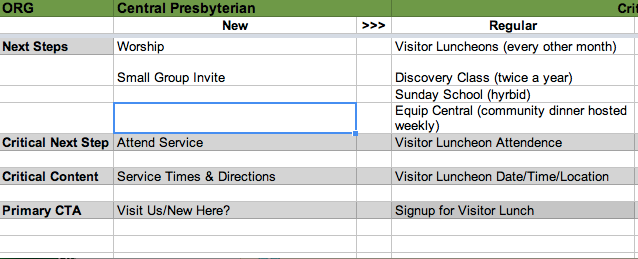
We've seen our fair share of bad church websites. Through our amazing design and content strategy services, it's our job to take these low performing, inefficient websites and turn them into well-oiled ministry machines.
Working with churches of all shapes and sizes, we’ve learned that success online isn’t the byproduct of some sort of magic formula. Take some design inspiration, mixed with the newest and shiniest bells and functionality whistles, blend and...voila! Conversions galore. Truth is, there's no way around it, an effective web strategy takes a lot of good old fashion planning.
You can greatly improve the results of your next church website with these 3 quick wins:
1) Assess your current situation
These days, with a variety of real time tracking tools at our disposal, we have NSA like intelligence on how projects are performing.
The proper use of these tools can provide a wealth of information about what your visitors are actually doing on your website, not what you hope they're doing. Digging into desktop and mobile bounce rate percentages, average visit duration and top search terms may sound a bit daunting but this data represents real people who are searching for something in your neighborhood.
During a recent church website project, we uncovered that it took 4 clicks to simply find service time and direction content for new visitors. Every unnecessary click is like putting a barrier in the way of your visitor to take the next step in the process.
Assess if you’re putting barriers in your visitors way and plan to eliminate them.
2) Know what success looks like online
If you don't know what success looks like online, you won't ever be able to achieve it. What are your church's top priorities? The most successful projects have clarity on what their priorities are.
Here are some common priorities:
- We want to more effectively attract and nurture new visitors
- Our goal is to better assimilate people into the church's ministry groups using the website
- We plan to increase our church wide adoption of small groups from 50% to 75%
After uncovering a top priority to attract new visitors with a client, we were able to help increase traffic to their new visitor content by 250% by decluttering their site and making priority content prominent. New visitors were able to quickly and efficiently find the content they needed that encouraged them to visit the church.
These are ministry goals that mean something. These are goals that pass the "prayer test" (things you’d actually pray for as a ministry team). Define what success looks like and build in periodic check-ins to see if you're measuring up.
3) Know your audience and define critical paths for them
Wouldn't it be awkward if I prepared a speech on penal substitutionary atonement and delivered it to k-5 kids? Or, how about, a doctrine of communication to a room full of junior high students? I speak from experience on the latter. Sound silly huh?
If you want to be effective you need to know who you’re speaking to and what makes sense to them. Don't assume they have prior knowledge, speak in understandable terms, and avoid internal ministry lingo.
What next? What are you actually calling your visitors to? Define what it is and make sure it aligns with your internal ministry process.
Here is an example of working through next steps and critical paths during a content audit with a current client:

Plan ahead to incorporate these three wins into your church website and your visitors will thank you for it! If you feel stuck or have any questions, please comment!








